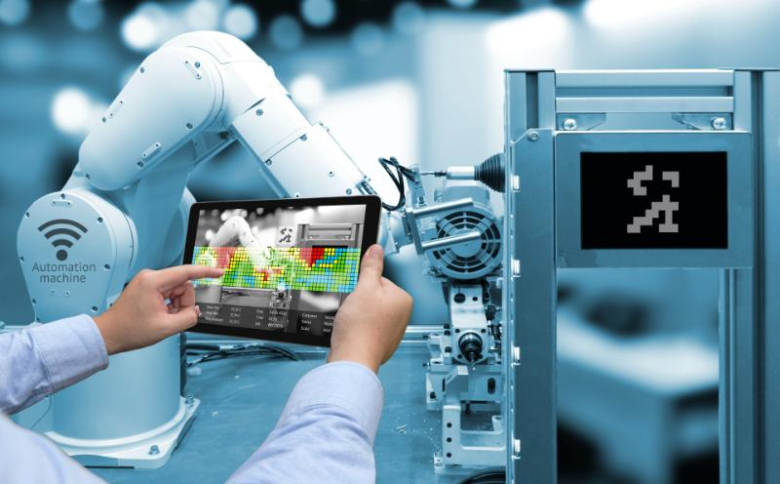Control and Automation Engineering is an emerging field in the era of Industry 4.0, where intelligent machines and digital technology drive production activities. This field integrates mechanical, electrical, electronic, and computer engineering with artificial intelligence to design, operate, and optimize smart factory systems and production lines.
Students in this field will gain comprehensive knowledge in control theory, embedded systems, industrial robotics, and specialized software for simulation, programming, monitoring, and operating automated equipment. With this skill set, graduates can take on highly technical roles such as control and automation engineers, PLC programmers, robot engineers, or managers of modern automated production lines.

With the deepening digital transformation, most manufacturing businesses are heavily investing in automation to increase productivity and reduce costs. As a result, students in this field are in high demand and are even sought after by companies before graduation. The employment rate for graduates remains high and stable.
Career opportunities in this field are diverse, ranging from system operators and maintenance engineers to control solution designers, industrial application programmers, technical managers, and lecturers in vocational training and university institutions. They can also participate in large projects or become consultants in the field of automation.
Salaries in this field are competitive. Fresh graduates can earn from 10 to 18 million VND per month, and with 2 to 3 years of experience, this figure can increase to 20 to 50 million VND per month. For those with high expertise, proficient in control programming and robot operation, or working in an international environment, the salary can easily exceed 50 million VND per month—an attractive figure for any young engineer passionate about technology and innovation.
Business Data Analytics
Business Data Analytics is a field that combines business knowledge with data analysis skills to make strategic decisions, forecast market trends, and optimize business operations. It sits at the intersection of three critical pillars: information technology, statistics, and business administration.
In an era of explosive digital data growth and intense market competition, businesses can no longer rely solely on experience and intuition to make decisions. They need quantitative analyses and solid data to determine consumer trends, manage risks, optimize costs, and personalize customer experiences.

Large corporations, banks, financial companies, e-commerce platforms, healthcare providers, insurance companies, and telecommunications firms are all undergoing significant digital transformations and are in dire need of data-literate professionals who can provide strategic insights. Even in startups, the role of a data analyst is often considered the “strategic brain,” helping founders identify opportunities and risks before making pivotal decisions.
In terms of salary, this field offers one of the highest remuneration packages in the technology sector in Vietnam. Entry-level analysts can expect a salary of 10 to 20 million VND per month, while those with 3 to 5 years of experience can earn up to 30 to 50 million VND per month. For senior positions, such as Head of Data Analytics, the salary can reach 80 to 100 million VND per month.
With the ongoing digital transformation and the increasing demand for data analysis, Business Data Analytics is becoming an increasingly promising field, offering attractive career opportunities and high incomes to those passionate about data and technology.
Petroleum Engineering
In the context of energy’s strategic role in economic and social development, the petroleum industry remains vital to ensuring national and global energy security. Vietnam possesses significant oil and gas reserves, especially in the southern continental shelf, providing favorable conditions for the strong development of oil and gas exploration, processing, and export in the coming years.
However, there is currently a severe shortage of highly qualified human resources in the field of petroleum engineering, especially engineers with specialized knowledge meeting the stringent standards of multinational energy corporations. This situation has made Petroleum Engineering an attractive choice for students, offering promising career prospects and lucrative income potential.

Students in this field will acquire knowledge ranging from basic to advanced levels in various areas, including petroleum geology, oil field exploitation, well drilling and completion, oil and gas transportation and processing, deepwater oil and gas exploitation, occupational safety, and environmental protection in the petroleum industry. Upon graduation, they can pursue careers as petroleum engineers, drilling engineers, petroleum geologists, or researchers in geotechnical engineering, contributing to global energy exploration and production.
One of the standout features of this field is the exceptionally high salary it offers. Fresh graduates working for domestic companies can expect a monthly income of 15 to 20 million VND. Those working on offshore rigs or for foreign energy corporations can earn 2,000 to 3,000 USD per month (equivalent to 50 to 75 million VND), excluding allowances and other benefits. Notably, for engineers with over five years of experience, the salary can surpass 100 million VND per month, making it a dream career for many young people passionate about technology and eager to take on challenges.
Electrical and Electronics Engineering
Electrical and Electronics Engineering plays a pivotal role in the development of industrial, economic, and modern technological infrastructure. This field involves studying and applying principles of electricity, electronics, industrial electricity, telecommunications, and automation to design, manufacture, operate, and maintain electrical and electronic systems and equipment for various industries and daily life.
There is a constant and high demand for human resources in this field, especially as Vietnam is rapidly developing smart industrial parks, smart cities, smart grid systems, and transitioning to clean energy. Graduates can pursue various career paths, including industrial electrical engineers, design and installation engineers for electrical and electronic systems, automation engineers, equipment maintenance and repair specialists, technical officers in power companies, manufacturing enterprises, construction companies, or lecturers in technical universities and colleges.

By 2025, this industry is expected to require approximately 1.5 million workers, with about 700,000 positions requiring a college or higher educational background. Starting salaries for Electrical and Electronics Engineering positions typically range from 8 to 15 million VND per month. Research and development engineers can earn higher salaries, ranging from 20 to 50 million VND per month, depending on their capabilities and experience.
Reputable universities in Vietnam offering Electrical and Electronics Engineering programs include Hanoi University of Science and Technology, Hanoi University of Industry, Electric Power University, Ho Chi Minh City University of Technology (Vietnam National University-Ho Chi Minh City), University of Technology (Vietnam National University-Hanoi), and Ho Chi Minh City University of Technology and Education. In 2024, the entrance score for this field ranged from 20 to 26 points.
Aquatic Product Processing Technology
Aquatic Product Processing Technology is a crucial field in Vietnam’s economic development strategy, especially in the agricultural and aquatic product export sector. This field equips students with in-depth knowledge in raw material procurement, quality inspection and evaluation of aquatic products, processing procedures, packaging, and preservation techniques to meet domestic and international market standards.
In recent years, Vietnam’s aquatic products have made a significant impact on the global export market, with an annual turnover approaching 10 billion USD. This impressive figure highlights the enormous potential of the industry and underscores the urgent need for well-trained and skilled human resources in aquatic product processing, quality control, and management.

Graduates in this field have diverse career opportunities, including technical officers in aquatic product processing factories, production process supervisors, product quality control officers, and personnel in the development of value-added products such as canned food, frozen seafood, fish sauce, fish oil, or surimi. They can also work in quality control centers, laboratories, and organizations for aquatic product quality inspection and food safety.
In terms of salary, this field offers competitive remuneration within the technology and engineering block. With solid expertise and practical experience, individuals can achieve a relatively high income, and management positions or jobs in export companies can bring monthly salaries of up to several dozen million VND.
As Vietnam continues to promote the development of its marine economy, focusing on deep processing and improving the quality of agricultural and aquatic products, Aquatic Product Processing Technology remains a promising field for young people passionate about food technology, production, and exports.
































